Readings in Translation
Pet Sitting
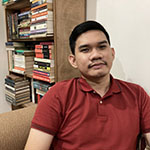
Eric Abalajon is currently a lecturer at the University of the Philippines Visayas, Iloilo. His works have appeared in Ani, Katitikan, Loch Raven Review, Cha: An Asian Literary Journal, The Tiger Moth Review, Dx Machina, and elsewhere. Recently his poems are included in the collections Sobbing in Seafood City (Sampaguita Press, 2022) and Footprints: An Anthology of New Ecopoetry (Broken Sleep Books, 2022). He can be found on Instagram at @jacob_laneria, and on Twitter at @JLaneria. He lives near Iloilo City.
 BACK TO ISSUE
BACK TO ISSUE
 BACK TO FOLIO
BACK TO FOLIO
Nicko Reginio Caluya translates Edgar Calabia Samar
NO DEITY OF FIRE
Translated from Filipino
The first to turn to ashes were our memories.
We forgot her like the way we burn things
that we are leaving to the past. So now,
we have nothing to return to but the resentment
of other nymphs: Cacao, Makiling, Sinukuan.
We gaze at the flint and are baffled
with the lack of legends about fire
in this corner of our hearts and souls.
Which enchantress stole the embers from Ladlao,
our god of the sun, to fill the furnace of this body
with the heat of life? We are lovers filled
with a past worn thin by the curse of sunny
and rainy seasons every year. Survived by clearing
jungles, what is it that we’re still shocked about the menace
of natural things: the strength of the blowing wind
and flooding at the city’s center struck by typhoon; cracks
on the soil of the town rocked by tremors.
Our emotions are steeped with the churning
of water, earth and air, hence we are asking:
so when is the fire in our chests blazing?
She may have bidden farewell while the jungle
is being razed, and ashes we remain who gave love
to her unjustly because merely ordinary:
just coming in close the body is already being ravaged.
So we are telling now: there is no deity of fire,
while we lament the victims of the inferno
or remain sleepless with Amihan’s frigid air during rainy season
CORNER
Translated from Filipino
Mother got lost before.
Turning to the wrong woods. Wrong turn
to the woods. An enchanted may have (al)lured.
Her clothes were turned inside out
but the way home wasn’t found.
There was no moon when she came back,
and her last month expecting. Eight months.
She was allowed back home
and life passed by.
On Good Friday I was born.
Murmured by many: Agimat.
Whoever was desired will fall in love.
Whoever got blinded will be possessed.
Mother’s moan was certain:
Tiyanak.
I did not cry.
She got home
but none returned.
FOLKTALE
Translated from Filipino
The legends of our land
swell. Memory held
in its wounded palm
those that could not be healed
by time: the insanity
of the nymphs, the crowding
of the manananggal and tikbalang
in the deepest corner of fear,
the settling of ghosts
on all the innocence
that the city turned away,
the escape of anito from recollection
of beliefs. It’s mysterious here,
warned the sorceress
of the thorn on our soles
while we are being misguided
by her invitation
to leave the dip nets that we hold
and wade through cries of currents
against the mossy stones.
Crashing so often
are all our aspirations
to leave what passed by.
Look back at where you came from,
whispered the mermaid to the waves
every time the river carries us away
to the sea of uncertainty.
But what we stumble upon
is only salt by the seashore.
The question from many tiyanak
who drown in the mystery of the night:
Where did the moon come from?
And we will feel the pang
of losing our minds
on their realm.
Moons are cure to years,
sighed the old nuno dwelling
on the anthill while watching
the fleeing light
of the fireflies. And also, we too
will depart: pressed on our hearts the pain
of those whose names left unbaptized
who are residing, depending
on the stories not listened to anymore.

Edgar Calabia Samar also writes novels and teaches Philippine literature at Ateneo de Manila University and Osaka University. Online, he’s @ecsamar on Twitter and Instagram.
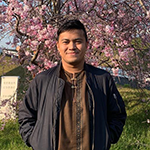
Nicko R. Caluya is an Assistant Professor at Ritsumeikan University. Aside from teaching and researching Information Science, he loves writing and translating in English and in Filipino. You can find him online at nickocaluya.github.io or @nickocaluya on Instagram and Twitter.
 BACK TO ISSUE
BACK TO ISSUE
 BACK TO FOLIO
BACK TO FOLIO
Tilde Acuña translates U Z. Eliserio
MY GOD
Translated from Filipino
Little people remain
Helpless against heaven
—Jose F. Lacaba, “Beloved Pasion of San Jose”
1
Father always sends linked messages – text messages arriving in segments. If you ask me, I don’t have time for such inconveniences. Grinds my gears whenever I read *some text missing*
Particularly right now, that I am here on Earth. Heaven-sent “linked 2/2” takes too long to arrive. Can’t remember if it’s Gabriel or Azrael who asked me for Angel’s Breath body powder as pasalubong souvenir. Sometimes, once my inbox identifies JHVH as the sender, I delete His incoming message at once. In doing so, I am unable to send back a reply. If that happens, I receive a barrage of missed calls – just like what happened last night. But that’s His best effort – a missed call – since He wouldn’t waste His valuable time on me.
Now, my phone’s low-batt. Father is a pestilence to my cellphone pastime.
If I turn it off, I will be anxious. Especially if I see others using their phones. My hands can’t contain themselves, they’re developing a consciousness of their own, in reaching my cellphone. And, I cannot help but read Father’s messages, which I’d rather not see because of what He did.
Thank the deities, cellphone use isn’t allowed in airplanes! Mine’s power was turned off, out of reach, others’ are turned off, out of reach. My decision to ignore notifications was justified, and there’s no temptation that’s gonna give my hands lives of their own.
Aboard the Gulista, a Boeing 747, Flight 666, departing from Manila, going to Cebu, I was located somewhere around the middle of the airplane, near the wing, on the left column of the seats. Seated between two Bombays, Saladin and Gibreel. I got to know them, shared stories with them, but not for long because something smells—and that something’s me. Haven’t taken a bath for forty days.
Gibreel, an artist, was sleeping and dreaming on his seat near the aisle. Saladin was looking through the window while practicing for his advertising stint in Cebu.
Me? I was reading news clippings about the convict Ruben Ecleo Jr.
For some, he is it, the one. Sent by the Father, the Son, the Holy Spirit. But due to many sorta crap, he is in jail. They say he killed his wife to collect insurance money. He allegedly had something to do with the massacre of a family in Bacolod, somewhere in Cebu.
I literally went down to earth to amuse myself, to forget that reprehensible revelation in heaven. But Ruben gave me a mission, a purpose. I am gonna visit him. Give him assurance, strength. Get your act together. Believe! You are—blessed!
But who is really blessed these times? Surely ain’t me. And for most, ain’t Ruben either. In their opinion columns, both Randy David and Mon Tulfo commented on the looks of the Philippine Benevolent Missionary Association’s leader. I was very certain of that face, memorizing every detail, every line. Who would ever think that a bald man with matching enraged eyes is blessed?
“A black man can steal your radio, but he can’t be your saviour,” said the film Dogma.
The stewardess was walking towards me, bringing food and drinks. A healthy woman, meaty—I remember Maria. The stewardess offered a drink to the man sitting in front of me: water, tea or coffee?
“So tell me what you want, what you really, really want,” said the stewardess.
Why do Filipinos speak English with each other?
The man answered: “Gusto ko it tinapay ag gusto ko it kape. Tanan ro ako nga gusto ay sundon ninyo.”
Oh, I get it. The man is Bisaya. The stewardess nodded, and they understood each other. Me? I didn’t get it, what the man answered. That’s why I am worried in this trip to Cebu. I did not know Cebuano-speak.
Now the stewardess stood in front of me. “So tell me what you want, what you really, really want,” she said.
I thought of cracking a joke. Just for laughs, so she would be entertained. I am fond of joking, especially in telling a story. I know how boring man’s life is. Somehow, by telling kuwentong kutsero tall tales, I can make someone smile. Man needs katarantaduhan nonsense to make them forget for a while the suffering of his dreadful existence.
I responded: “Nais kong mabuhay sa haba ng panahon” (I want to live through the length of time).
She would’ve returned with a quip, but a shout from the front of the airplane snatched everyone’s attention.
The white, blonde, Americana-suit-donning men revealed themselves and wielded high-powered weapons. One forced his way into the cockpit, while the other two guarded the passengers, scaring them off by shouting at them to shut them up.
Hi-jack! Hi-jack! People shouted. The Americana goons whacked them.
Oh no, hi-jack! This might end up like 9/11 in America. I like that film so much, especially the scene where those two planes crashed into the World Trade Center—but I only like it as a work of fiction!
I needed to call for help.
Bowed my head. Then, went on a fetal position. Slowly took out my phone. Power: on.
Son of a Dog-fuck! I forgot I only have one bar left! How can I make a call?!
This is Father’s fault.
Still tried my luck. Tut-tut-tut. I looked at the two Americana goons, they ignored me since they were focused on threatening other people.
“If you are not with us, you are against us,” said one. No doubt about it, a terrorist rhetoric.
Tut-tut-tut.
Hold on, getting there. Ugh. They struck a man. Bastards! It’s okay, everything’s fine though the victim took the hit in the head badly—he sacrificed himself for our sake.
Tut-tut-tut.
From the front portion of the plane, one Americana goon walked towards the middle. Perhaps going to the restroom.
Tut-tut-tut.
Here it comes, getting there!
The balance on your prepaid account is zero. If you would like to reload, please dial 22—
One Americana goon stood in front of me. He snatched my cellphone and whipped me with his gun. I turned water inside his body into wine. He collapsed on the floor. I stepped on Gibreel’s face so I can cross the seats as if they’re fences and go towards the restroom. Another Americana goon sprayed bullets at me.
2
After staying in Manila for three months, I found out the fuss about Ruben. The June 20, 2002 headline of the Philippine Daily Inquirer caught my attention: “Cult leader dances as law officers close in.” I can’t believe it. Is that really Ruben? From what I’ve heard, Father always had intimate conversations with him. They were dear to each other.
That’s why I realized he must have felt really, really bad. He must have thought that he is forsaken, betrayed. Eli! Eli! Lama Sabachthani? I know that feeling. That’s why I decided to go to Cebu to rekindle the vanishing spark of his faith.
However, a dilemma—there’s a problem: I have been broke for two months.
Upon my arrival on earth, I was someone who can be called “rich.” I had with me thirty pieces of silver. But I’ve already spent them all.
No, you’re wrong, I didn’t give alms to the poor. No, you’re mistaken, I didn’t spend everything on wine. And, no matter how tempting because of Maria’s infidelity, you’re incorrect, I didn’t waste my resources on women.
I used them all on prepaid.
I know, I know, it’s wrong. I admit it, I am an addict. Gotta learn self-control. But what can I do? It feels so good. The cellphone is the invention that benefitted mankind the most, next to TV.
Why did I use up my money quickly? Well, my phone was stolen twice. Of course, I had to buy a newer model as replacement. (GSM, got shit from a mugger). Then, of course, I had many textmates. I love texting goodmornings and goodnights. Sending ringtones and picture messages. There was a time, only a few times, that I ended up calling. That was only a few times. I am not a dunce to waste credit.
I also used texting for important things. Like gameshows.
Yes, gameshows. I always took chances at being a text partner in GAME K N B? (R U GAME?, in English subtitles) I joined as many contests as I can, like channel 9’s I M GME, and also channel 2’s SMART K N B? (R U SMART?, in English subtitles), and channel 7’s READY, TXT, GO!
I haven’t ever been a winner, but one will never know, someday I might. That day will come. Just wait and be patient. That’s what the Bible teaches, right?
Problem: I was already a sore loser by the time I had to go to Cebu. I thought of working, since I went under training as a carpenter and a fisherman. But there were no job opportunities!
I looked around and I realized that I am not alone in being lost and hopeless. The Philippines is lost and hopeless, too.
Exaggerated? Not really, it’s not as if I was the only one who can’t find a job. If that’s so, then you can call me lazy. But in the last news report, numbers of unemployment in this dying country reached four million. This meant, the whole machinery of job creation was wrecked.
And if that’s not enough evidence that I ain’t just dissing for the sake of dissing, here’s more: thirty-two million over eighty million Filipinos lived below poverty line, imagine, living on less than 38 pesos a day—less than a dollar! That amount won’t even buy a happy meal!
Because of this rottenness of the system, I chose to enter the flesh trade. The income wasn’t that bad, my rate was five hundred pesos—about ten dollars. I was my own pimp, I didn’t have to share my earnings with anyone. My spot was just over at Makati. I had charms, as someone black. Customers thought I have a big dick. I am not saying that I have a small dick. But, you know that, if you’re black, the assumption is that you have an enormous member. That’s very prejudiced! Good thing I don’t disappoint.
Within thirty nights, I earned enough in order to book my ticket to Cebu, plus pocket money! I was all set, everything was planned. I also managed to buy boxes of condoms. In an episode of Mission X, I learned that there are many whorehouses in Cebu.
But in my thirty-third night in the flesh trade, supposedly my last night in Manila (one for the road, as they say), I met Satan.
Satan, light of my life, fire of my groins. My sin, my soul. Sa-tan: the tip of my tongue step twice to tap my teeth. Sa. Tan.
He is Sa, simple Sa, full erection in the morning, eleven inches, no kidding. He is Sat when wearing slacks. He is Shane when wearing skirts. He is boss Lucy at work. He is Natasia in Chavit’s ledger. But in my arms, he is always Satan.
Let me tell you how I met him: I was standing, together with my friends Julio and Roberto, at the corner of Avenida Street, chit-chatting, chewing gum, when a nice car stopped by. Windows rolled down and my jaw dropped at the pleasant sight—looks like Richard Gere!
“Hello girl, it’s been a while,” was his opening line, as if we’ve known each other.
He told me he’s gonna need my services—take note at the specific details—for 6 (6, 6!) whole days. I would have begged off, since I didn’t need more money then, and I was also in a hurry to visit Ruben. The most recent news I heard was about someone attempting to stab him with a toothbrush, and I was very worried.
But Richard Gere (I had no idea that time that his name is Satan) told me two things that made my heart blush: “Kailangan ko’y ikaw, dito sa buhay ko” (You are the one I need, in this life of mine) at “Dadalhin kita sa ‘king palasyo” (I will take you home to my castle).
I responded: “Shut up, shut up. You had me at hello, you had me at hello.”
He said he will drop by at the same time, the same street, the following night. I agreed right away. His car dashed off.
Until now, the smoke of his muffler lingers in my nostrils.
I went home after that, I left Julio and Roberto. They complained, accused me of being a traitor. Get a life, I thought. It was Monday. I met him on Monday.
We meet each other again on Tuesday. He paid the down payment for my services.
He confessed his love on Wednesday. Looking worn out, I entered a chic clothes shop called Rapunzel. The saleslady pushed me away. That’s how it is in the Philippines, if you aren’t rich you are ostracized.
I loved him back on Thursday. I returned to Rapunzel, with him. He picked fights with the salesladies. We also bought clothes (the most expensive ones!)—in that place.
Friday was full of love. It’s Friday, we’re in love. He took me to a power dinner. We dined with the father and son who owned the company that he would aggressively take for himself soon. It was a shame I didn’t know which spoon and fork I was supposed to use for escargot! (who the fuck invented utensils when we can just eat with our bare hands?) Our dinner buddies taught me how. After I enjoyed lots of dishes, Satan damned them and we left the restaurant. We didn’t pay our share of the bill.
On Saturday, I was raped by Satan’s friend, a fatass baldy who looks like George from Seinfield. Satan caught us in the act. He fumed with rage at fatass baldy. As penalty, that friend completed the bill I charged to Satan.
Come Sunday, it rained all over the world, my love left me.
I still remember our last exchange of words, we were at the entrance of Fontain Blue:
“Will I ever see you again?,” I asked
“What does your heart tell you?,” he answered
“Turn and walk away, that’s what I should do. My head says go and find the door, my heart says I love you.”
His car dashed away. Until now, I still smell the fragrance of his muffler.
“Shane!” I cried. “Shane! Come back!” but he never heard me anymore.
3
Something’s shaking my head. I opened my eyes. A woman was placing a cup near my mouth. My nostrils dilated. The liquid inside the glass, it was yellow and it smelled strange—a drugstore stench! I tried to resist, but I failed and felt the liquid through my throat. I felt dizzy, numbed. My perception of the environment changed. I am uncertain of what follows.
We laid down on a four-post bed. I was under a blanket. She was on top of me.
I asked the woman: “Nas’an na ba ako? Kaninong kama ‘to?” Ilang beses na ba akong nagigising sa ibang kwarto? (“Where am I? Whose bed is this?” How many times have I woken up in another room?)
My worry diminished when she answered: “Mon ami, ne vous permettez jamais que folies, qui vous feront grand plaisit.”
She is Bisaya—which means I was in Cebu, then! Under the blanket I groped my groins. Thank the Father! There it was, my cellphone! I took it out—the woman leapt. Screamed her heart out!
Didn’t care, I turned my phone on and tried to find out what happened to me. It was three in the afternoon, Friday, when I died. At the break of dawn, Sunday, I lived again. I stood. I knew I had no clothes. The woman screamed louder.
I looked at her. Pretty. Her long hair, in pigtails. She had retainers. Her chin, sharp. She looked like a dog. I went nearer. Tears flowed from her rounded eyes.
Distanced my self. I used the blanket as a robe. Her anguish took a pause. She just bowed down. Sob. Sob.
I was about to ask a question when a young man rushed in. With him was fish and bread.
We gazed at each other.
He’s sexy.
“Mamay?” asked the young man. When the woman kept silent, the man rushed towards her, accidentally letting go of fish and bread. I hurriedly picked up what he dropped. No worries, it was on the floor for less than five minutes. I swallowed the bread. The fish, I didn’t. It was tuyo dried fish. No, thanks. Pass. Filipinos love dried fish, because they have nothing else to eat. They would comfort themselves and convince one another that it tastes good, but I know that’s far from true. Just a whiff of the smell, just the looks of it, is disgusting. It is the symbol of poverty. Tasty, for Filipinos. Hmp. They are deluding themselves, denying the truth, so they can forget hunger.
The two locked each other in an embrace. I was envious. Woman whispered something to the young man. He faced me and screamed.
He whipped out a gun. I was afraid. Needed an artificial barrier. I multiplied the tuyo— filled the room with them. Then rushed out the door. Thanks to me, they’ll have years’ worth of supply of their favourite food.
I kept on running and running, just like Forrest Gump. Suddenly found out that I was already in the squatters’ area. I was astounded with what I saw: tenements, young and old residents bathing naked in the roads, dirty estero canals in the middle of the streets, train rails. Is there any other place more piss-poor than Cebu?
Stopped many times to observe and watch couples quarrelling. But I sustained my speed, as I felt the young man still going after me. Keeping up. Touching down.
I kept on running and running. Only stopped upon arriving at the entry towards the squatters’. I sat on the bench near the sari-sari variety store and drank with two men, whom I later knew as Impen and Igor. They’re nice, unbothered by my strange outfit. But, they had me pay the gin they ordered. That’s fine. In Jerusalem, I always sponsor the drinks. Cheers!
The chit-chat went for a long time. Impen was already drunk. Noticed he was black just like me. I also noticed the big signboard all over the entrance of the building in front of the store: “University of the Philippines.” There is already a UP in Cebu? Must be a new campus? But then, why do buildings look like ruins?
My head was spinning, I inhaled deep so I can take my environment in. I saw the gin, I smelled the gin, I tasted the gin. Impen nudged me on the arm. He said he’s gonna tell me a story. I didn’t quite understand because he told me in the Cebuano language. But I managed to string the words together.
This is Impen’s story: an old man in the farm hacked a landlord. Hacked, as in a tabak blade was used. Why not, if the landlord keeps on taking the land from the farmer? That is the only property of the old man, hence the hacking. The old man ended up in jail. The old man’s son, named Diego Saling, was raped by the landlord.
Impen’s story had funny elements, but I’d rather like it better if he kept bullshit like social issues out of the text. In this era of globalization, who would want to hear stories about the poor and their poverty? Your audience will tend to think, life has been nothing but sadness, and here you are, telling us about depravity right to our faces?
But it didn’t end that way, see, there’s a sequel! Before the story’s ending, first there’s the part when Diego Saling gave birth. A poor family took care of his child, Yna. That poor family is the family of Impen. But Yna should have been rich, she is a landlord’s daughter after all! Growing up poor, she nurtures a golden heart even though she is beautiful and sexy. She was maltreated by those vulgar foster children of the landlord, but she later found out that she herself is also a child of the landlord, so she became rich. Impen was filled with joy, at last, someone will save him from poverty. He and Yna were close, and she used to call him “Kuya Impen.” Unfortunately, son of the Dog-fuck, the girl with a golden heart had amnesia.
“…stat rosa pristina nomine, nomina nuda tenemus,” Impen concluded.
The sun’s caress already felt horny when we arrived at the ending. Impen was about to share more stories like that of Yna, as there are many abuses perpetrated by landlords in the countryside. But he and Igor already had to work. He went forth to fetch water at the community well, as I hailed a taxi to take me to the prison which holds Ruben.
“Naligo na sa iyang kaugalinong dugo?” he yapped.
I nodded as if I understood.
He continued blabbering. He laughed, I laughed. He sniffed and sobbed, I caressed his shoulders. He shouted in anger, I swore in Aramaic.
I was quite engrossed with the taxi drivers’ adventures, until I received a text message from Father. As usual, in segments! This was the first part:
“Linked: 1/2 Gsus dnt procd. Sumthngs wrong w d loc ur going. Ur not n cb *some text missing*”
This one, I managed to read. The second one, which arrived ten minutes later, I immediately deleted. I was so pissed that I turned my phone off.
I felt so angry at Father. The audacity! And, He never said Sorry, not even once! He’s the one who owes me an apology, yet He acts like everything’s fine. We are fake ok, while He knows that He hurt me!
The driver seemed to notice my mood swing, because he shut his trap.
Sayang, how unfortunate, I wanted to listen to his voice. His anecdotes tackle Philippine society and revolution. But that’s how it was. Another score for my great Father.
A few minutes passed, and I arrived at my destination. I gave him a handsome tip, since I also enjoyed his stories even though I haven’t had enough and I want more.
Almost in a good mood then, because I was about to see Ruben. But my head throbbed and ached as something startled me: “Davao penal colony” declared the sign?
How come “Davao Penal Colony,” if this is Cebu? I was worried. Maybe this was what Father meant to tell me in His text. Davaopenalcolonyincebu, davaopenalcolonyincebu, how did this happen? I tried to focus. Forbade myself from uttering a prayer.
And the epiphany came upon me not from heaven but from me myself. I was in the Davao Penal Colony—of Cebu! No different from Murphy, New York, and Annapolis: streets in Cubao. Or Panay Avenue in Quezon City.
Patting myself on the back, I sighed. Thanked my self. I didn’t leave my self hanging. I always guided my own way. The only problem I had was how to enter the jail. Tried the obvious way: I proceeded through the door. The guard stopped me.
“Man wird die Menge nicht eher zum Hosianna-rufen bringen, bis man auf einem Esel in die Stadt einreitet,” he said with oozing anger, while pushing me away. When I tried to step closer, he whipped out a gun. I left. When I was meters away, I gave him the finger. Then I ran. Fucktard didn’t come after me.
From behind the Meralco electric post I observed the entrance to Davao Penal Colony. Had to get in. Ruben’s faith might give in. I had to make a way, quick.
It was already 12:30 when I waited for my chance.
2:00, and nothing’s happening.
2:30, a pitbull piss-marked the Meralco post as his territory. He also pissed at me.
3:00, three o’clock habit prayer.
4:00, a number of whores offered their services, to which I politely said no.
6:00, from a motel, I was returning to the Meralco post when I heard the bells ring. Nice. I found out that the churches of Cebu were still in use.
It was 8:00 when I found what I’ve been looking for. A van stopped at the entrance of the prison facility. From this van, emerged three men. All of them, men of the cloth. Priests! They’re probably there to speak with Cebuano prisoners, have them confess, hear mass, and collect indulgence. They gave me an idea.
I hurriedly looked for a church. Upon entering, I quickly asked a hunchbacked sacristan. He brought me to the priest. I beat the hell out of the priest—a chinky-eyed chubby geezer, and I stole his costume. That’s fine, I am sure he is a sinner.
9:00, with a smile, kiss to the hand, and good evening, the guard—that wanted to shoot me upon entry to the Davao Penal Colony a while ago—welcomed me. People treat you better with these clothes. But if you’re wearing a blanket as dress, even an inch of respect, nope, you’re not getting any. What more if you’re not wearing anything at all.
But I set aside my pains against the world. Going right in and starting the search for Ruben, I traversed the prison, this place of discipline and punishment.
What a pity, these prisoners of Davao Penal Colony. Worse than the jails of Jerusalem. A hundred people, packed together in a room suitable for fifteen. I also noticed most of them suffer from illnesses: TB, boils, sore eyes, herpes, rheumatic heart disease, rectal cirrhosis. None of them had the chance to take a bath, and less than half of them can’t shit in peace. And though they tried to hide them from me, I still saw prisoners who are minors, massaging old people. Oh, poor youth, the hope of the nation—they’re girls.
Postponed my search for Ruben. I helped those in need first. Healed some lepers. Resurrected someone who died after being piped down in a rumble. Multiplied hopiang di mabili may amag sa tabi—unsold meat pastry with molds. But I cannot save them all. What can someone alone on his own do, even if that someone is the Son of the Father? Needed backup.
I turned on my cellphone to text Pedro and company. Unable to send my message yet when my inbox received a barrage of text messages. Memory’s already full, especially with my old 6210 model! I pocketed my phone. How annoying can Father get?!
Proceeded with my search for Ruben.
In the highest floor, in the farthest cell, in the smelliest and darkest place, was where I’ve found him. Alone, sitting by himself. Holding a gun with his left hand while with his right—a cellphone. My fingers itched.
I stepped into his cell. He jerked and stood up. His eyes, ablaze with hate. His head shining with baldness. Ruben, I started. Ruben, I practiced these lines a lot:
Don’t be confused with my costume. I know that priests cannot be trusted. Ruben, it’s me, Jesus. I am here to tell you that I wouldn’t ever forget you. I wouldn’t ever forsake you. It will come to you, the divine glory. Just wait and be patient. I know that most treat PBMA like a cult. They say that people—who believe that upon my return to Earth they will inherit the wealth of Dinagat Islands—are weird. Does that belief qualify as cult? Do Latin inscriptions on objects make something some sort of a cult? Anyone believing in miracles, do they count as cultists? If one believes in a faith that seems otherworldly, is that already a cult? How about members of the Church of Jesus who believes that their iglesia church will take off and fly upon second coming—have they ever been called “cultists”? The Catholics believe in transubstantiation— have they ever been called “cultists”? The Christians believe that Mary is a virgin upon giving birth— have they ever been called “cultists”? Of course not, because they are in power. This world, Ruben, belongs to those in power. But I am already here, Ruben. I have returned and I have seen you once again. And now, let the weak say “I am strong,” let the poor say “I am rich.” Let there be light. Let there be peace on earth, let us go then, you and I—
I noticed that his left hand trembled. Grinding his teeth, he looked at me. Then his right hand trembled.
“Bakit ngayon ka lang, dumating sa buhay ko?” (Why did you arrive in my life too late?) sung his cellphone. He answered. A miracle, he talked. It wasn’t just a missed call.
“I’ll give you medicine, when your tummy aches. Build you a fire when the furnace breaks. All I want to do is grow old with you,” sung my cellphone, I quickly took it out. My LCD reads:
FATHER
Calling…
I looked at it. The phone didn’t stop ringing. The grander miracle, Father wasn’t just ringing a missed call. It is a sincere phone call. A rare opportunity. Should I answer or not? Let’s wait for more rings.
Ruben was done with the call he received, only his left hand was shaking. Father continued ringing my cellphone. Should I answer?
Why not? Maybe, He is ready to say sorry. But what if He will just scold the hell out of me?
Enk! Oh no, low-batt already.
I answered the phone.
Rumbling of Father: “GSUS TC! DAT ISNT RUBEN. DAT S MANER—” oh shit.
Too late. My head exploded. My brain, devoured.
4
For a long time, I’ve been suspecting Maria of infidelity. At first, it was fine for me if she commits adultery. I know she was a whore on earth, and the saying “old habits die hard” wasn’t new to me.
As always, I was the butt of all jokes in drinking sessions. Blind item in tabloids. Even my Mother looked at me in a bad way. Her tirades against me, about my masculinity occurred more often. I suffered all of it, because I love Maria. And the journey to manhood that my demanding Mother expected of me was too phallocentric. Weeks passed by.
It would’ve been okay. I was proud of my martyrdom as a husband. But one day, Mother scolded me, I endured kilometres and kilometres of sermon. With my eardrums blasted by Mother, I decided to go home to beat Maria up so she wouldn’t fuck other people.
The house was in chaos upon my arrival. I became more enraged. In the room, I saw Maria in deep slumber. She was very sweaty and she breathes heavily. She wears no bra and her panty had a hole. There was blood in the bedsheet. I hated myself, I had no shame for having a lot of suspicions, while Maria was tired all day keeping the house together.
I went out again. I searched for my Father, just for a chit-chat. I went to white castle, where he resides.
The butler-angel told me then that Father is busy. He doesn’t have time for any visitor. Is that even allowed, a God with no time to spare for the Son of Man? Father with no time for the Son? What could be the reason why the King of Heaven isn’t responding?
“Huwag mo sanang akalaing natutulog pa ang Diyos” (Don’t you dare think that God ever sleeps) the butler-angel told me. I thumped the crown of his head. I proceeded towards Father’s room.
I found him in a fetus position on the bed. Hugging a pillow, talking (“ah, ah, ah”), drooling, wearing neither shirt nor pajama. I shook him by the shoulder.
“Hey, wake up! It’s time for you to rise,” I said, as I pull the pillow he was hugging.
And I was disturbed as I see the bra and a piece from Maria’s panty. Worn by my Father.
Crying, I stormed out of white castle. The tempest greeted me. It was the break of dawn when I returned home. Soaked, I cannot even enter. Lost my keys. I knocked. Maria opened the door for me.
Her eyes were red. She embraced me. She wept on my shoulders. She told me that Father raped her. I didn’t let her continue what she was saying. I pushed her inside the house, then closed the door. I killed her. I texted Pedro. I asked his help to dispose the body. First, we tried to fit the remains in a black plastic (the one used as garbage bag). When the body wont fit, we chopped it to pieces. Each with a plastic, we, Pedro and I, rode his Cherokee and went near the riverbanks.
It would have been a perfect crime, full cover-up, my alibi: I was drinking with Pedro, we would make it look like Maria eloped with a lover.
But someone saw us—Maria’s sister. I had to have the entire family of Magdalena killed. Mother told me to take a vacation, go down to earth.
“My God” by UZ. Eliserio (trans. Tilde Acuña) will appear in Lagunlón: Anthology of 21st Century Filipino Crime and Mystery Fiction (forthcoming from Running Wild Press).

U Z. Eliserio’s most recent book is Shooting the Zombie Apocalypse (University of Santo Tomas Publishing House, 2022). He dreams of becoming a painter and sculptor. Visit him at ueliserio.work.

Tilde Acuña (Arbeen Acuña), author of Oroboro at Iba Pang Abiso [Oroboro and other Notices] (University of the Philippines [UP] Press, 2020), teaches at the Department of Filipino and Philippine Literature – UP. His works of translation appeared in Pingkian: Journal for Emancipatory and Anti-Imperialist Education, and books published by Gaudy Boy, UP Press, Ateneo De Manila University Press, and Sentro ng Wikang Filipino. He co-edited Destination: SEA 2050 A.D. (Penguin Random House SEA, forthcoming 2022) and translated its komiks entries.
 BACK TO ISSUE
BACK TO ISSUE
 BACK TO FOLIO
BACK TO FOLIO
Michael Carlo C. Villas translates Amado Arjhay Babon
BAD GUYS IN FPJ’S* MOVIES
Translated from Waray
Sometimes they’d sport a barong.*
Oftentimes, mustachioed. Very rarely, with none.
He stands for the opulent and corrupt life.
Brazen like lightning and thunder in the skies.
Macho-shit.
Disrespectful to women.
Chews and spits invectives like betel.
Wields power over the military and police.
Kills those he spites.
Praised by liars and thieves.
The oppressed and the poor beg for his mercy.
Yet his power has an end.
Da-King* finishes him off to the edges of the screen.
*Fernando Poe, Jr., famous Filipino action star
*Traditional Filipino shirt for men usually made of pineapple fiber
*Poe’s title, a Filipinized form of the English, “The King”
SONG OF SMALL-EYED SIRENS
To Imelda P.* and many others who were befriended by those who are not like us*
Translated from Waray
In the deep seas, says my grandfather,
where you spread out your sails
to speed your voyage on water,
those who are unlike us work their charms.
“Many sailors have brought stories
about sirens with small eyes,
stories of those who have gone before us
and those who have never found their way home.”
Old folks would speak of times they spent
in the deep, in poetry, even, on a full moon
and drunk, utter poems about strange songs
captivating, leading ships to their doom.
“Close your eyes. Cover your ears.
Before the sea’s sadness swallows you.
Many ships have not made it back to port,
most of them buried in the depths of the blue sea.”
Their songs allure like golden promises
you will desire your entire life.
Once spellbound, you will merely
be remembered in the poetry of the folk.
“Neither be seduced by their songs—they are not for you—
nor be awed by the lure of their voices. If, perchance,
you meet them at sea, cover your ears,
think deeply, forget yourself not.”
* Imelda P. refers to Imelda Papin, known as “the duke box queen of the Philippines,” who came out in a controversial music video justifying China’s encroachment of the West Philippine Sea.
*Transliteration of “diri sugad ha aton,” a phrase referring to enchanted, otherworldly beings
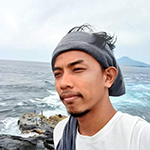
Amado Arjay B. Babon is a member of the Katig Writers Network, Inc. He is an alumnus of the Lamiraw Creative Writing Workshop and Iligan National Writers Workshop. He writes poetry, plays, and fiction in Waray. He also acts in and directs plays. He is currently taking Masters of ASEAN Studies at the University of the Philippines-Open University.
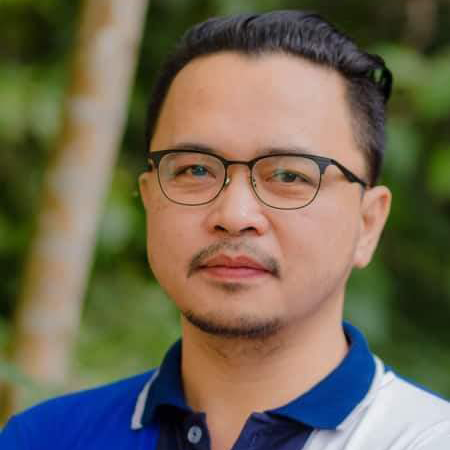
Michael Carlo C. Villas teaches language and literature at the Department of Liberal Arts and Behavioral Sciences, Visayas State University. He has published in journals and anthologies, notably, Our Memory of Water: Words After Haiyan (Ateneo de Naga University Press, 2016), Sustaining the Archipelago: Anthology of Philippine Ecopoetry (University of Santo Tomas Publishing House, 2017), and Reading the Regions: Teaching Philippine Literature from Multi-Perspectives (National Commission for Culture and the Arts, 2019). He co-edited the forthcoming anthology, Garab: Hinugpong hin mga Susumaton ha Waray (Garab: Anthology of Short Stories in Waray, Balangiga Press).
 BACK TO ISSUE
BACK TO ISSUE
 BACK TO FOLIO
BACK TO FOLIO
Merlie M. Alunan translates John Iremil Teodoro
ONE CLOUDY AFTERNOON AT THE DE LA SALLE UNIVERSITY MUSEUM WHILE VIEWING THE FLOWERS IN THE PAINTINGS OF ANITA MAGSAYSAY-HO
Translated from Kinaray-a
This afternoon the Museum’s all mine
as once I claimed your smile, one noon-time
gazing down from a window
at the terrace of an old mansion in Silay City.
Joyous fragrance glow in the colors
of Anita Magsaysay Ho’s flowers.
However, the dead rot of flowers fester
in the rain-drenched garden of my heart.
I am waiting for the glass door to open
and for you to come in, your chinky eyes
crinkled with your smile.
You graduated last trimester, I know,
found a job in that giant of a building
along Ayala Avenue. Off to a good start, you are,
chase your dreams as capitalist lifestyle prescribes.
No time now to write those stories, those poems,
these wild flowers that burst out of your being
that I may claim as mine, over and over.
Last week we were together
in a videoke joint across the street.
We toasted the fact of our being writers.
Once drunk, you couldn’t stop singing
about a woman you’ve loved who jilted you.
A good thing you forced on me
those three beers.
I could blame them for the bitterness
in my throat, inside my heart.
The next morning, you texted to laud me
for the tragedy I wrote about two men
in love with each other.
Bitter beer rose to my tongue again,
I texted you back,
“Then this is the end, and I thank you.”
No reply from you. I deleted you
from my cellphone’s memory.
It is freezing in this museum.
A normal thing for all museums
to be frigid so as to preserve
the masterpieces of such sculptors and painters
as Anita Magsaysay Ho,
saving the last glory of flowers
dying slowly in their pails and baskets,
somehow eking the last bit of life
from cold and fetid water.
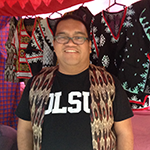
John Iremil Teodoro is from San Jose de Buenavista, Antique. He is Associate Professor and the Graduate Program Coordinator at the Literature Department in the College of Liberal Arts of De La Salle University. He is also the Associate for Regional Literature of La Salle’s Bienvenido N. Santos Creative Writing Center. He holds a Bachelor of Science in Biology from the University of San Agustin in Iloilo City, and a Master of Fine Arts in Creative Writing, and a Doctor of Philosophy in Literature from DLSU. He is a multi-awarded writer in Kinaray-a, Filipino, Hiligaynon, and English. He is the author of more than 12 books and his collection of short essays, Pagmumuni-muni at Pagtatalak ng Sirenang Nagpapanggap na Prinsesa, won the National Book Award from the Manila Critics Circle and the National Book Development Board. Teodoro, a scholar of Hiligaynon Literature, contributes reviews, travel pieces, and cultural reportage to AGUNG, The Daily Tribune, and Liwayway Magazine, where he is writing a regular column on books and the importance of reading. He is presently the Secretary General of Unyon ng mga Manunulat sa Pilipinas (UMPIL or the Writers Union of the Philippines.)

Merlie M. Alunan began her work on translation with the Ulahingan project of Dr. Elena Maquiso in Silliman University 1997, when she became part of a team that rendered selected parts of the epic chant in archaic Manobo into English. Her most important works include Sa Atong Dila (University of the Philippines Press, 2015), an introductory anthology of Visayan Literature; Susumaton Oral Narratives of Leyte (Ateneo de Manila University Press, 2016); Tinalunay (University of the Philippines Press 2018), an anthology of Waray Literature; These titles, and Running with Ghosts and other Poems, a collection of poetry, earned the National Book Award for 2016, 2017, and 2019. She has done translation work in at least four Visayan languages, Waray, Cebuano, Kinaray-a, and Hiligaynon. She translated the first collection of poetry of Adonis Durado, entitled Dili Tanang Matagak Mahagbong / Not all that Drops Falls (Asteismus Press, 2008), and Temistocles Adlawan’s collection of short stories, Kay Dili Buta ang Gugma / Because Love Is Not Blind (University of San Carlos Press, 2009). She has published six collections of her own poetry under the following titles: Hearthstone, Sacred Tree Hearthstone Sacred Tree (Anvil, 1993), Amina among the Angels (University of the Philippines, 1997), Selected Poems (University of the Philippines, 2004), Tales of the Spider Woman (University of Santo Tomas Publishing House, 2010), Pagdakop sa Bulalakaw ug uban pang mga Balak (Ateneo de Naga University Press, 2016), and Running with Ghosts (Ateneo de Naga University Press, 2017). Her works have been recognized by the Palanca Memorial Awards for Literature. Her life work has also been honored by UMPIL, the Sunthorn Phu Award by the Kingdom of Thailand, the Ananda Coomaraswamy Fellowship of the Republic of India, and Ani ng Dangal. She was granted Professor Emeritus upon her retirement from University of the Philippines Tacloban College in 2008.
 BACK TO ISSUE
BACK TO ISSUE
 BACK TO FOLIO
BACK TO FOLIO
JL Lazaga translates Linda T. Lingbaoan
THE NIGHTS CANNOT KEEP STILL
Translated from Ilokano
The nights cannot keep still
from the oddly sweltering feeling
bursting from within.
Fright? Hesitation? Anger?
The throbbing can’t be explained.
It wouldn’t leave, trailing like a shadow.
There is an anxiety in the chest that cannot be cast off,
like a cutting sharpness,
a specter that cannot be warded off.
The stubborn question persists
picking the wounded mind,
even if one closes one’s eyes to the excruciating pain.
There is a nightmare that will not allow respite,
like rust that spreads entirely
gnawing the flesh.
You know very well:
The sky may be colorful,
yet looking up to the moon
is not the cure to a tarnished trust.
Playing amusement with the stars
or sailing with closed eyes
is not the answer that you are searching for.
LOVE ALSO WANES
Translated from Ilokano
The cord is cut
The ring is broken
The candle died out
The contract that was supposedly unbreakable
Is torn
Time seemed to drift away
The smile that seemed not to wane.
How would two souls
See eye to eye
When fists remain clenched
And hands are unwilling
To touch each other?
The path diverges
If the stomach contracts
When unfed
From an empty table.
Who will stand witness
To the love that fills
A hungry mouth?
Affection dies
When two people who vowed
To live together forever
No longer understand each other.

Linda T. Lingbaoan (Hermilinda T. Lingbaoan-Bulong) is of Tinguian descent. A trained psychometrician, she earned her Bachelor of Science degree and master’s units in Psychology at the Saint Louis University in Baguio City, and also took courses in Industrial Relations and Creative Writing at the University of the Philippines (UP) Diliman. Most of her short stories, essays, poems, and novels in Ilokano have been published in Bannawag magazine, where she has served as a section editor (1983-1988), making her the first and so far only woman to be in its editorial staff, and after which she became the Associate Editor of Abra’s Tinig ng Bayan, and a contributor to the weekly community paper, Abra Today. Prior, she worked as a guidance counselor and instructor at the Divine Word College of Bangued (1980-1983). She worked for the human resource of the Philippine Heart Center (1990-1991) before her employment with UP as university research associate at the College of Arts and Letters (1991-1993), and as information officer (1993-1996), and editor (since 1993) at the UP Press, until her retirement in 2020. She is a recipient of the Cultural Center of the Philippines Grant for Essay (1994) and the National Book Development Board Writing Grant (2014) for her novel, Kalinawa (2016). Her poems, “Agmawmaw Met ti Ayat” (“Love Also Wanes”) and “Di Makaidna dagiti Rabii” (“The Nights Cannot Keep Still”), were published in Bannawag in 2014 and 2018, respectively. A multi-awarded and respected writer, she was named Most Outstanding Citizen of Peñarrubia (1994) for Literature, and has been given the Gawad Pambansang Alagad ni Balagtas (2015) for Ilokano fiction by UMPIL, and the Leona Florentino Award (2015) by GUMIL-Filipinas.

JL Lazaga (Junley L. Lazaga) is a multilingual creative writer, translator, and an associate professor at the University of the Philippines Baguio. He was a fellow at the first Cordillera Creative Writing Workshop (2007), a founding member of the Ubbog Cordillera Writers, and a past president of the Baguio Writers Group. He won first prize in the poetry competition of the Timpuyog dagiti Mannurat iti Iluko (TMI) in 2010, was cited by the Baguio Midland Courier as Translator of the Year for 2016 and 2021, and has been conferred the title of University Artist (2018-2020) at the University of the Philippines.
 BACK TO ISSUE
BACK TO ISSUE
 BACK TO FOLIO
BACK TO FOLIO
Kristine Ong Muslim translates M.J. Cagumbay Tumamac
GENERAL SANTOS CITY IS PART FIRE
Translated from Filipino
part fishermen, traders, workers, and children
inhaling
the pungent fish smell and open air of the wet market
facing the sea and Purok Islam.
How many times were people forcibly driven away
by the nearby military encampment? How many times
were their homes razed down?
According to the news, no one
was killed in the former, while a five-year-old died
from the latter. What always follows: the homeless
are rounded up and made to meet visiting
politicians, so they can pose
for photos and receive promises
of relocation, which is usually in faraway places.
One of the people who lost his home in a fire
talks of the certainty of homecoming—
how the gills tend to hone in to the salt of the sea
and the nose
the pungent fish smell and open air
of the village in front of the wet market.
ZERO
Translated from Filipino
When you reach ground zero, the fog is already spreading over the masjid’s crescent moon. The place has been empty for months. You are looking for the most vivid picture of destruction. You know this view is unlike anything you have seen. Soldiers keep instructing people to walk farther past the masjid but never stray beyond the roadblock. As you take snapshots, you tremble in the cold. Then it rains. Zero visibility. Scrambling away from ground zero, you fail to see the empty mansions next to the refugee tents. The unending line of posters of politicians running for the next election. The slumped refrigerator door, swathed in fog but not shivering in the cold.

M.J. Cagumbay Tumamac is a writer and reading advocate from southern Mindanao, Philippines.

Kristine Ong Muslim is the author of nine books of fiction and poetry, including The Drone Outside (Eibonvale Press, 2017), Black Arcadia (University of the Philippines Press, 2017), Meditations of a Beast (Cornerstone Press, 2016), Butterfly Dream (Snuggly Books, 2016), Age of Blight (Unnamed Press, 2016), and Lifeboat (University of Santo Tomas Publishing House, 2015). She co-edited the British Fantasy Award-winning anthology People of Colo(u)r Destroy Science Fiction! (2016), Ulirát: Best Contemporary Stories in Translation from the Philippines (Gaudy Boy, 2021), and several forthcoming anthologies. She is also the translator of numerous books by Filipino authors Mesándel Virtusio Arguelles, Marlon Hacla, and Rogelio Braga. Widely anthologized, Muslim’s short stories were published in Conjunctions, Literary Hub, and World Literature Today, and translated into six languages. She grew up and continues to live in a rural town in southern Philippines.
 BACK TO ISSUE
BACK TO ISSUE
 BACK TO FOLIO
BACK TO FOLIO
Kristine Ong Muslim translates Mai Santillan
FROM A FAT WOMAN
Translated from Cebuano
I walked along Cogon
(where god forbid up until now
had no proper pedestrian lane)
and someone hissed at me.
I did not mind them
but it hit a nerve when he said
“Hey, fatso, how come you’re sexy?”
I was wearing—a bodyfit dress.
I knew my figure was on the heavy side.
I’m just tired of sucking it in.
But I had nothing to say.
I was caught off-guard.
Litsi.
In his eyes,
my hips were too broad.
In his eyes,
my arms were flabby and graceless.
In his eyes,
my breasts were up for grabs.
In his eyes, I’m a meal.
Nevermind being greasy.
I am so tired of watching myself
through other people’s eyes.
So what if I am fat?
Isn’t there more of me to love?
THE EVACUATION
Translated from Cebuano
Look at the wall.
The drawings you made
as a child that had long ago been erased
snatched away in a flash by the storm
without any of us knowing.
Our shoes and slippers,
vinyl records and cassettes,
aluminum pots and the stove,
all swept away into god knows where.
We now need
to wrap the drinking glasses in newspaper
and fold the remaining clothes
before placing them in cardboard boxes.
Let go of the memories
that shake up our evacuation plans.
This is only temporary. Just stick this out
since, in any case, whenever we grow restless,
there will still be home for you with me.

Mai Santillan is a spoken word artist, poet, and playwright born and raised in Cagayan de Oro City. She was a fellow at the Sterelogues Playwriting Workshop in 2012, the Sulat-Dula Mindanao Playwriting Workshop in 2013, and the Davao Writers Workshop in 2014. Her writings have appeared in the Dagmay Literary Journal, the Kabisdak Cebuano Literary Lighthouse, the Manila Bulletin’s Bisaya Magasin, and the Carayan Journal. In 2018, Bulawan Books published her chapbook, Gikan sa Babayeng Bilbilon: Mga Balak. Tinubdan: New Voices from Northern Mindanao also includes a selection of her works.

Kristine Ong Muslim is the author of nine books of fiction and poetry, including The Drone Outside (Eibonvale Press, 2017), Black Arcadia (University of the Philippines Press, 2017), Meditations of a Beast (Cornerstone Press, 2016), Butterfly Dream (Snuggly Books, 2016), Age of Blight (Unnamed Press, 2016), and Lifeboat (University of Santo Tomas Publishing House, 2015). She co-edited the British Fantasy Award-winning anthology People of Colo(u)r Destroy Science Fiction! (2016), Ulirát: Best Contemporary Stories in Translation from the Philippines (Gaudy Boy, 2021), and several forthcoming anthologies. She is also the translator of numerous books by Filipino authors Mesándel Virtusio Arguelles, Marlon Hacla, and Rogelio Braga. Widely anthologized, Muslim’s short stories were published in Conjunctions, Literary Hub, and World Literature Today, and translated into six languages. She grew up and continues to live in a rural town in southern Philippines.
 BACK TO ISSUE
BACK TO ISSUE
 BACK TO FOLIO
BACK TO FOLIO
John Bengan translates R. Joseph Dazo
SOMNIPHOBIA
Translated from Cebuano
I hold firmly the books I’ve bought from Booksale while riding a jeep on the way back to the apartment where my mother and I are staying. The vehicles along the length of Mango Avenue move in a sluggish pace. The passengers quietly listen to the sound of heavy rain and the jeep’s rumbling engine. Most of them have dozed off to its lullaby. I peer outside and see the road wrapped as if in a cape of anguish. The rain shows no sign of letting up, and it has put the world to sleep.
The passing moments are spent watching the closing and opening of the passengers’ eyes. I ask myself how many dreams have died at the waking of their eyes, and how many came to life each time they shut them again.
Is closing one’s eyes also a form of opening?
A young man, perhaps my age, is the only other passenger left awake inside the jeep. He’s in front of me. His eyes are on me. I’m not so sure. Maybe he’s looking at the older man distinguished by his tattoos. Perhaps, he’s staring at the woman carrying her white cat. As the jeep we’re on drive off, our eyes meet. Five or six times maybe. I’m not able to count.
When he holds out his fare, his fingers are like fireflies taking shelter in my palm. “Salamat,” he adds and the fireflies flit away from my hand. This, my palm, he could very well live in it. “Lugar lang,” he says then clinks a peso coin on the metal railing. He wakes those who are sleeping, along with the feeling I want to put to rest for eternity.
Our eyes meet, for the last time, and he allows himself to be swallowed by the rain.
Dawn. What I always see in my room: three cups of coffee—two emptied and one half full, until it grew cold—on the table. “You’re not going to sleep yet?” Nanay says when she sees me still awake at dawn. “You have class later.” For seven months, I’ve tried not to sleep. I read novels, check if I have messages on my phone, drink coffee, write a poem then crumpling it after, do homework, meditate and jerk off (or meditate while jerking off).
I look out at the world outside. It’s still raining. The first of the year. At the trickling of rainwater on the closed windows, the young man inside the jeep still hasn’t left my mind. I should have looked at his ID so I would have known his name and added him on Facebook.
I get up and watch the shadows of people tramping in the rain and embraced by the despondent glow of streetlamps, and coldness. But the lights from the tall buildings rage as if at the darkness of the world. My eyes also want to surrender to sleep. However, isn’t sleep another way of wasting life?
How could we allow ourselves in this vast universe to sleep without being loved?

R. Joseph Dazo is the author of Ubang Gabii sa Mango Avenue (Kasingkasing Press, 2019), and co-editor of an anthology of queer literature in Binisaya, Libulan Binisayang Antolohiya sa Katitikang Queer (Cratos, 2018). He has won the Carlos Palanca Memorial Award for his short fiction. His short fiction has been published in Bisaya, Words Without Borders, New Reader Magazine, and the forthcoming Lamyos New LGBTQ Fiction from the Philippines (University of the Philippines Press). He is the founding editor of Katitikan: Literary Journal of the Philippine South. His second collection of short fiction is forthcoming.

John Bengan teaches writing and literature at the University of the Philippines in Mindanao. His stories have appeared in Likhaan, Kritika Kultura, Asian Cha, and BooksActually’s Gold Standard, an anthology of Asian fiction from Math Paper Press. His translations of Elizabeth Joy Serrano-Quijano’s fiction have appeared in Words Without Borders, LIT, ANMLY, World Literature Today, and Shenandoah. He co-edited the anthology Ulirát: Best Contemporary Stories in Translation from the Philippines (Gaudy Boy, 2021).
 BACK TO ISSUE
BACK TO ISSUE
 BACK TO FOLIO
BACK TO FOLIO
Michael Carlo C. Villas translates Reynel Ignacio
EARTH IS THICKER THAN BLOOD
Translated from Waray
With your knowledge, you will part the lands
your parents and ancestors left you.
Here is where you will drive into the ground
the fence of your principles—your side, their side.
For everything to fit squarely,
every obstruction shall be felled
including the mango tree
where you once carved your names.
Each of you will build a palace
in its place. But secure your foundation
or canopies of trees will encroach
on land not yours. For land titles
will be spread out like a mat.
And laws will cover your eyes
until you are blind to each other’s faces
so that even the mind will fear
remembrance of things past—
times when you were carefree,
running freely on open grounds.
Tracts of land are why you made it up
in life. So that even in your last breath,
you held onto your titles, having forgotten
that the earth you so treasured
is the same earth that is your grave.
Meanwhile, as your blood thins,
you wait for who will be buried
next under the earth
that none of you will ever claim.
LDR*
Translated from Waray
I still watch the dusk like we used to.
For us both, light of sundown is a blessing,
glimmering on the seas. At ebb tide,
I would write with my finger
your name on the sand. And at spring tide,
waves murmur the name it washes away,
name I traced with my finger, hoping
you would video-call, call, or message.
But waves have the habit of crashing, thrashing
to rocks this longing only to be grown
over with moss. Forgotten.
Now, my eyes grow heavy from salt
in the wind. Against the glare,
my eyes long for the cool shade of your face.
Perhaps this is why I allow the night to keep me
company—the cold, dark embrace
of sea and moon: No one knows when
the two will meet again, but their vows remain,
be it low or high water. True, we measure
our waiting with full moons.
And though the sun will never rise,
I will write your name on the sand
over and over
until
even
the foam
is
beyond
its reach
to erase
made obsolete.
*Acronym for long-distance relationship

Reynel M. Ignacio is a member of Katig Writers Network, Inc. He was a writing fellow for poetry at the Lamiraw Creative Writing Workshop (2008), UP VisWrite Workshop (2012), and Iligan National Writers Workshop (2017). For his poetry, he received the Jimmy Y. Balacuit Award, Chito Roño Literary Award, and Gawad Komisyon sa Wikang Filipino.

Michael Carlo C. Villas teaches language and literature at the Department of Liberal Arts and Behavioral Sciences, Visayas State University. He has published in journals and anthologies, notably Our Memory of Water: Words After Haiyan (Ateneo de Naga University Press, 2016), Sustaining the Archipelago: Anthology of Philippine Ecopoetry (University of Santo Tomas Publishing House, 2017), and Reading the Regions: Teaching Philippine Literature from Multi-Perspectives (National Commission for Culture and the Arts, 2019). He co-edited the forthcoming anthology, Garab: Hinugpong hin mga Susumaton ha Waray (Garab: Anthology of Short Stories in Waray, Balangiga Press).
